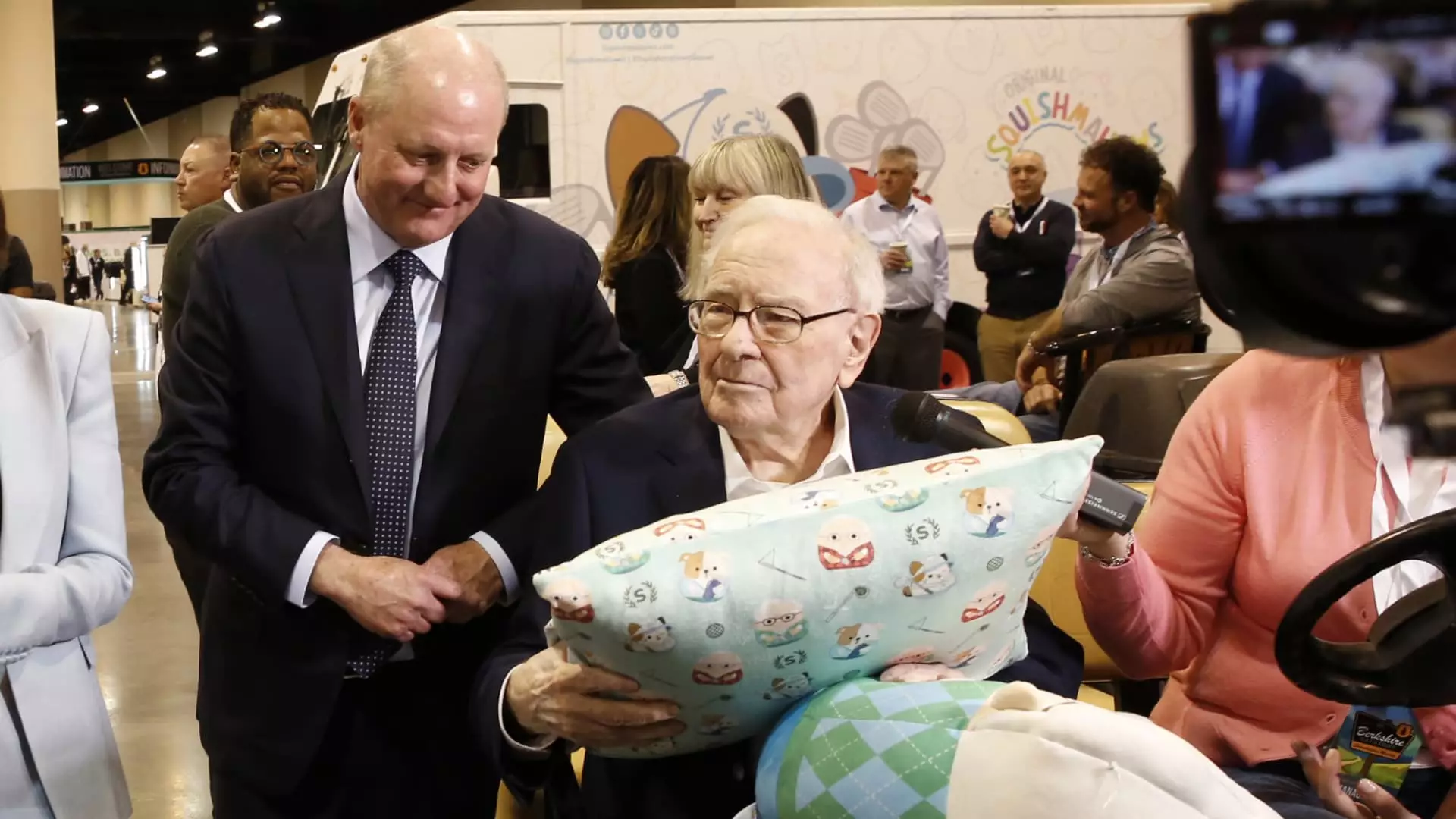On a seemingly mundane Monday in the stock market, an exceptional phenomenon unfurled—over $24 million in net inflows into Berkshire Hathaway’s Class B stock. This surge marked a substantial endorsement not just of the company but also of its incoming CEO, Greg Abel, who stands poised to fill Warren Buffett’s monumental shoes at the year’s end. What would compel retail investors to channel that kind of capital into a stock that saw a decline of over 5% on the very same day? The answer lies in the intricate weave of investor psychology and market sentiment, particularly in a landscape often fraught with uncertainty following the departure of a beloved leader.
The backdrop here is critical. Warren Buffett, revered as the “Oracle of Omaha,” stunned the investment world during a high-profile shareholder meeting, signaling his intention to hand over the reins of the $1.2 trillion conglomerate. Traditionally viewed as an immutable figure, Buffett has become synonymous with successful investing, characterized by his disciplined, value-oriented approach.
Buffett’s announcement resonated deeply, generating a surge in interest from retail investors, evidenced by one of the highest net inflow figures Vanda Research has recorded since 2016. This stands in stark contrast to the expectations many held that retail investors—a demographic usually skittish in the face of leadership transitions—would shy away from Berkshire. The confidence in Abel could signal a larger trend where the everyday investor seeks stability even amid volatile leadership changes.
Investor Sentiment and Berkshire’s Stability
Despite the immediate bearish movement in Berkshire’s stock, the retail investors’ decision to double down during a dip is indicative of a broader strategic mindset. In an era where uncertainty reigns—marked by inflationary pressures and economic headwinds—many retail investors appear to express an increasing longing for safety. Berkshire Hathaway presents itself as a fortress, bolstered by over $330 billion in cash reserves, a war chest that allows it to weather potential recessions and seize opportunity when market conditions are ripe.
Interestingly, the sentiments expressed by Buffett during the transition appear to have had a soothing effect on prospective investors—his firm belief that Abel would perform better in the long run than he himself could reassure those wary of change. Buffett’s declaration that he’d retain his shares, despite the shift in management, further solidifies his enduring faith in the company’s trajectory. If their revered leader sees promise in Abel’s leadership, why shouldn’t the little guy?
The Challenge of Following a Legend
However, the question remains: can Greg Abel live up to the legacy of Warren Buffett? The investment community remains divided. Abel, lauded for his operational acumen, hasn’t consistently displayed the stock-picking prowess that cemented Buffett’s status as a luminary in retail investors’ eyes. Yet, the optimism surrounding his transition must not be overlooked. Economic landscapes are shifting, and Abel’s management style may resonate more with modern investment strategies that diverge from the value-centered principles laid down by Buffett.
While Buffett’s leadership has been characterized as transformative, Abel has the potential to redefine Berkshire’s identity in the 21st century, adapting to new market realities. As we stand at the precipice of this transition, investors must grapple with their own biases—will they hold onto the faith embodied by Buffett, or will they cower under the weight of uncertainty that follows his departure?
The Broader Implications for the Investing Landscape
This scenario extends beyond Berkshire Hathaway; it serves as a critical case study in investor behavior during significant leadership transitions. The market’s exuberance in this instance demonstrates that in a time of great upheaval, there’s a concurrent rise in risk appetite among retail investors who are either hungry for returns or desperate for safe havens. Could this signify a shift in the broader market strategy amongst individual investors? The consistent narrative of fear, uncertainty, and doubt that fuels market crashes has been punctuated by this bullish behavior, suggesting an emerging class of investors who may be willing to take calculated risks—faith in established legacy firms being a prime motivator.
Berkshire’s rich history under Buffett stands testament to the power of trust, a powerful currency in the world of investing. As the investment community watches this intriguing leadership handoff, it may well paint a picture of what lies ahead—whether it be a legacy sustained or a new chapter floundering. With investor sentiment currently leaning towards optimism—however cautiously—the question remains if Abel can not only uphold but innovate upon the revered Berkshire Hathaway legacy. The road ahead is indeed uncertain, but it is one paved with the gold of new opportunities and historical caution.

